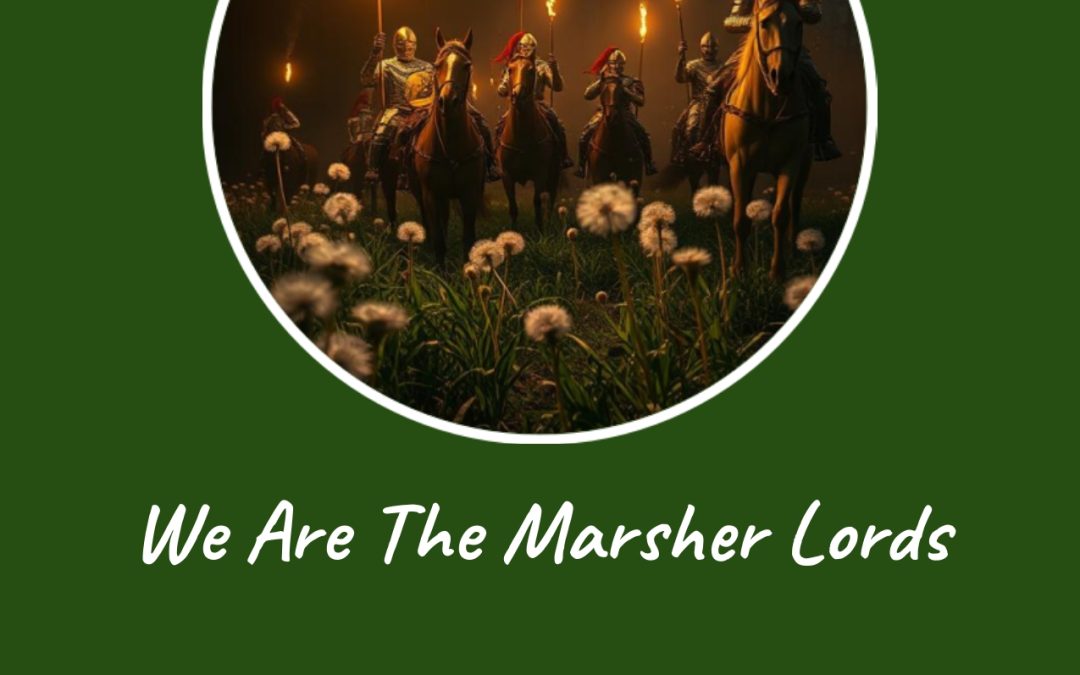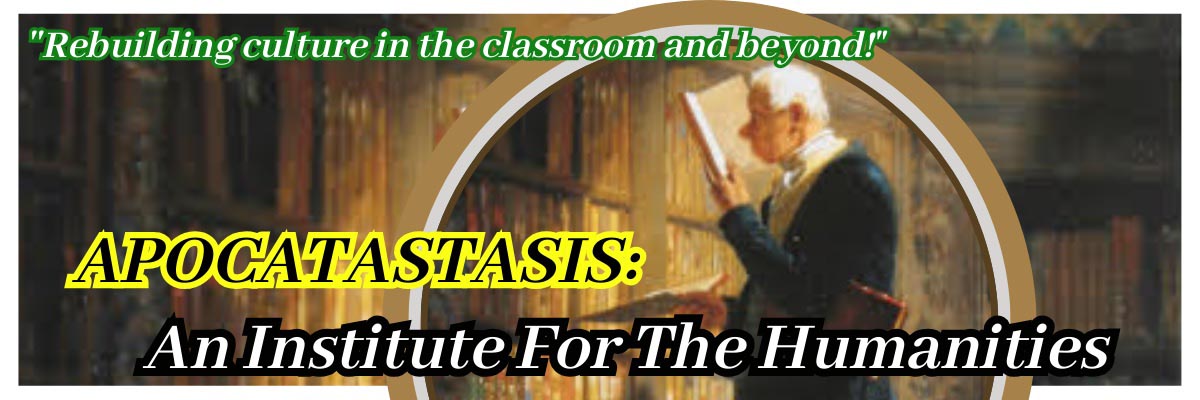Marsher Lords
In John Coleman’s new pedagogical essay “We Are The Marsher Lords,” he covers the mythological inspiration of Apocatastasis, the impotence of what dares calls itself “alternative education,” and he suggests three radical reforms that formal education become an holy, happy, and wholesome thing once more.
* NOTE: You may freely download/read the full “Marsher Lords” essay at, https://apocatastasisinstitute.wordpress.com/publications/ *
We Are The Mvarsher Lords (sample)
John T. Coleman
Principle & Foundation
It is now appropriate to get to the principle and foundation of Apocatastasis for these eleven years. I have in my hand a book. This book has been our constitution, this book has been our Bible, I speak of The Trotsky Train: Some Words To The Discipulate. I wrote it way back when. It kicked my ass out of Ridgefield and I only wish it had done so sooner.
In any case back before I learned to put page numbers on the books I published the good old days what is our principle and foundation because if we do not have principles we have nothing. We have nothing if we do not have principles. The Institute has been as true as the north star these eleven years because we have stuck to our principles, come hell or high water.
We read in that mighty tome, “Only when there’s stability to society, when men own their capital, when they memorize the poetry of the land, when local musical compositions and books proliferate, when the churches are packed each morning – standing-room only – for Lauds, and the same twice over for Sunday Mass, then the scholar can take a cigarette break, but only for a minute before he’s back at it again. It is your work, it is my work. There is your end to education, there is your wealth, there is your success.” Let’s us go on, let’s us dream, let us become besotted with that delirium of the brave which once and to come have made men and forged nations. We say that when there are no more attorneys on holy Connecticut, when there are no more banks on holy Connecticut, when there are no more ghostwriters on holy Connecticut, and when all their filthy works and pomps and morbidity find no more home here; when there are no bastard landlords, when these things have been scourged from the land, when that military base in Danbury is closed down, and when there is no longer the United States Corporation’s flag flying over Connecticut, when there is not one man in this state and in this nation and in this world who is swindled to give his labor to another in a job, when the money no longer devaluates, when there are no bums on the street, when the churches are unlocked, when the churches are full, when the synagogues are full – hey bring in the Jews tell them to stop killing the Arabs tell them we’ll build synagogues in Connecticut they can stop butchering the Arabs – when the Arabs are butchered no more, when this happy time comes, when we appreciate our culture, when we start making our own art, when we don’t pump in art from a continent away, from California or London, then our work will be done for a minute. We will not take a break till then. We have for these eleven years forged ahead on these points, keeping our eyes on the principle and foundation laid out all those years ago in that worthy book, The Trotsky Train laid. That book and that vision has been our constitution these eleven years; we have not wavered from that one iota, come what may.
We Are The Marsher Lords
Men of knowledge, teachers and learners, are marsher lords. This is how we should see ourselves, and this is what we are. So what is a “marsh” and what is a “marsher lord”? When we moderns think of a marsh, we think of a boggy area with mosquitoes and humidity, and maybe alligators come to mind; if we’re American we undoubtedly throw in banjo music to the association. And so it is. However, “marsh” is an old Medieval term of law; it designates the land between two kingdoms. Like in so many ways, you see, in Modernity we imagine borders quite differently. In these days of enlightenment we can literally have one foot on one country and one foot on another. There’s a very precise line where borders are nowadays. In the Medieval world, that wasn’t the case. There were marshes. That is to say, you have these very extensive gray areas of territory that no one really claimed, or they kind of claimed, or they half-assed claimed it. Marshes were extended buffers between territories. In precise modern statecraft, where borders are indeed definite things, entire nations stand in for the old marshes. The war in Ukraine, for example, is happening because that country effectively was a marsh between Russia and NATO, and the NATO trash violated that understanding.
Anyhow, in these marshes were people who would, you know, hang out in these places. These types you wouldn’t call darlings; usually they were desperados from one kingdom or another. They would hang out in these no-man’s-lands, just like the city of Laredo in America. If you go to the streets of Laredo, you know, who’s in Laredo? It’s all the criminals there; criminals from America that are running into Mexico to get out of the eyes of the cops up here, and all the criminals from Mexico coming into America, getting away from the cops down in Mexico. And that’s kind of what the marshes were. Thus, with these desperados about you had the development of the “marshal.” You’ve heard it in, you know, that movie US Marshals. Well, the marshall was the old common law officer appointed by the king to patrol the marsh for bandits and desperados. That’s that simile I would like to use for the scholar.
We are the marshal lords. We are the ones in a sense protecting this idea of knowledge and the pursuit of knowledge for its own sake and the pursuit of knowledge for the betterment of society. And like a marshall, you know, we have to face out into a society which doesn’t have
this sensibility, culpably or innocently. It’s just, it’s not really there. That’s our work, right? We’re here to work. Okay, that’s our work. We don’t need to complain about it. We don’t need to see the larger society as an enemy. All right, but we do have something to protect. And that is a certain sense of knowledge. The idea of education. Mark my words on this. To be educated does not mean you know a lot of things. To be educated means you hold yourself as regards knowledge and the men of knowledge with a certain deference, a certain humility. You have a certain attitude when it comes to knowledge, aleem, scientia, whatever language you want. That’s what it means to be educated.
You could be whatever this world considers to be low in terms of labor, in terms of your position on the social ladder. You could be low on that and still be educated because you control yourself and you comport yourself with a deference and a respect to knowledge. And you have a certain attitude of humility when you approach things of knowledge and men of knowledge. That’s what being educated means.
I come from a country that is highly schooled. To be educated and to be schooled are not the same thing. Ideally one encourages the other but they are not in fact the same thing. They are only superficially the same thing. Just like if I go to a fast food place in the drive-through and I’m driving on the highway with my burrito. You know, there’s my burrito and I’m driving and I have a burrito in one hand and a cell phone in the other and I’m looking at the television that’s in the car. I’m driving the car. You see these people sometimes. How is the car not wrecked? It’s amazing.
* NOTE: You may freely download/read the full “Marsher Lords” essay at, https://apocatastasisinstitute.wordpress.com/publications/ *










